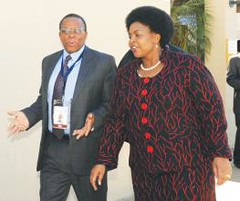
South African ministers Timothy Thahane and Maite Nkoana Mazhabane arrive in Windhoek, Namibia for the thirtieth anniversary summit of the Southern African Development Community (SADC) during the week of August 16, 2010.
Originally uploaded by Pan-African News Wire File Photos
From Caesar Zvayi in WINDHOEK, Namibia
Courtesy of the Zimbabwe Herald
Sadc Heads of State and Government yesterday resolved to suspend the Sadc Tribunal pending the outcome of a review by the bloc’s justice ministers and attorneys-general.
The summit here tasked the ministers and AGs to investigate the tribunal’s operations.
The review follows concerns raised by Zimbabwe querying the legitimacy of the tribunal’s rulings.
The process will last six months during which the body cannot entertain any cases pending re-constitution of its mandate and operations.
Speaking to local journalists after the issue was tabled in the summit yesterday, Justice and Legal Affairs Minister Patrick Chinamasa said the region should accept the fact that a treaty does not come into operation unless ratified.
He said as currently constituted, the tribunal — which was ratified by only five of Sadc’s 15 members — was a legal nullity.
To be operational, it needs ratification by 10 member-states.
"The decision of summit is that they approved the recommendation of the ministers of justice that a review be made.
"There was then a discussion if the tribunal should continue entertaining cases.
"The decision which has emanated from summit is that the tribunal should stop entertaining cases until completion of the study when it is hoped that the tribunal will be reconstituted and come up with a new mandate which would clarify its jurisdiction.
"This will also clarify its relationship with domestic courts; its relationship with community law versus domestic law.
"So the tribunal, as decided by summit, will not have power to entertain cases," he said
Some white former commercial farmers took their cases to the tribunal to try and reverse the land reform programme after the State acquired their farms for redistribution to the landless majority.
The tribunal subsequently courted controversy when it passed judgments that contravened Zimbabwe’s constitutional position on land reform.
Government made it clear it was not bound by the rulings as the tribunal’s constituting treaty had not been ratified by two-thirds of Sadc members as required.
Zimbabwe is one of 10 countries that have not ratified the protocol that seeks to give the tribunal force.
Harare’s position was backed at an Extraordinary Sadc Summit in Pretoria, South Africa, in August 2008 where leaders resolved that the tribunal’s standing be reviewed.
The review was not forthcoming, forcing summit to re-state its position when it convened in Kinshasa, DRC, last year.
Summit tasked justice ministers and AGs to commission a study on the whole concept and mandate of the tribunal.
The justice ministers resolved to make recommendations to commission the study.
This development created complications on the tribunal’s operations since the terms of office of five of the 10 judges had expired while one commissioner resigned.
This left the tribunal with only four substantive judges.
The summit was expected to extend the terms of the five judges whose tenure had expired.
However, regional leaders queried the wisdom of extending their tenure when the tribunal’s very legitimacy was in question.
Minister Chinamasa said: "The issue of the five judges still remains. There are four of them (remaining), whether or not they will continue to sit, the decision was that they will not entertain cases.
"We hope that as the Committee of Ministers of Justices and Attorneys-General, when we are carrying out this review, this study, we can include — wherever possible — whoever has served on this shortlived tribunal to put an input into the sort of animal that we want to see for our region."
Minister Chinamasa said Zimbabwe was not opposed to the concept of a tribunal, but simply wanted a properly constituted organ acceptable to all and which would only deal with matters referred by Sadc members.
"We need a tribunal, by whatever name, it is a necessary instrument for our integration but it must be done on a sound footing which recognises negotiations between member countries over those issues member countries want to refer to the tribunal," he said.
He cited the example of possible disagreements over issues like the customs union, the Free Trade Area and a regional currency, which national courts cannot resolve.
The minister said Zimbabwe would raise concerns with the Sadc secretariat’s legal department over the tribunal’s operations, which appeared to have been hurriedly constituted as a bloodhound against the revolutionary land reform programme.
‘‘When it (the tribunal) was rushed, almost immediately there were cases against Zimbabwe.
"So it’s like the tribunal was rushed and put into operation in order to reverse the land reform programme, but happily it has not succeeded and will not succeed,’’ he said.
At the time it began hearing cases on Zimbabwe, the constituting treaty for the tribunal had been ratified by only two member states.
‘‘At the moment it’s trying to reverse the decisions of our Supreme Courts, in fact it’s purporting to rewrite our constitutions.
"As you know our land reform is constitutional, and our courts have adjudicated over the matter and given the ruling that the land reform is legal, it’s constitutional.’’
Minister Chinamasa expressed hope that the six-month review, which he pointed out was really inadequate, would result in a properly constituted tribunal that would not overstep its jurisdiction.
‘‘The tribunal should never be the court of first instance . . . the way forward is to clarify issues so that member countries will have confidence in the tribunal,’’ he said.
There are also reports that the tribunal has ruffled South African feathers as some citizens of that country are reportedly approaching the body directly while sidestepping national courts.
No comments:
Post a Comment